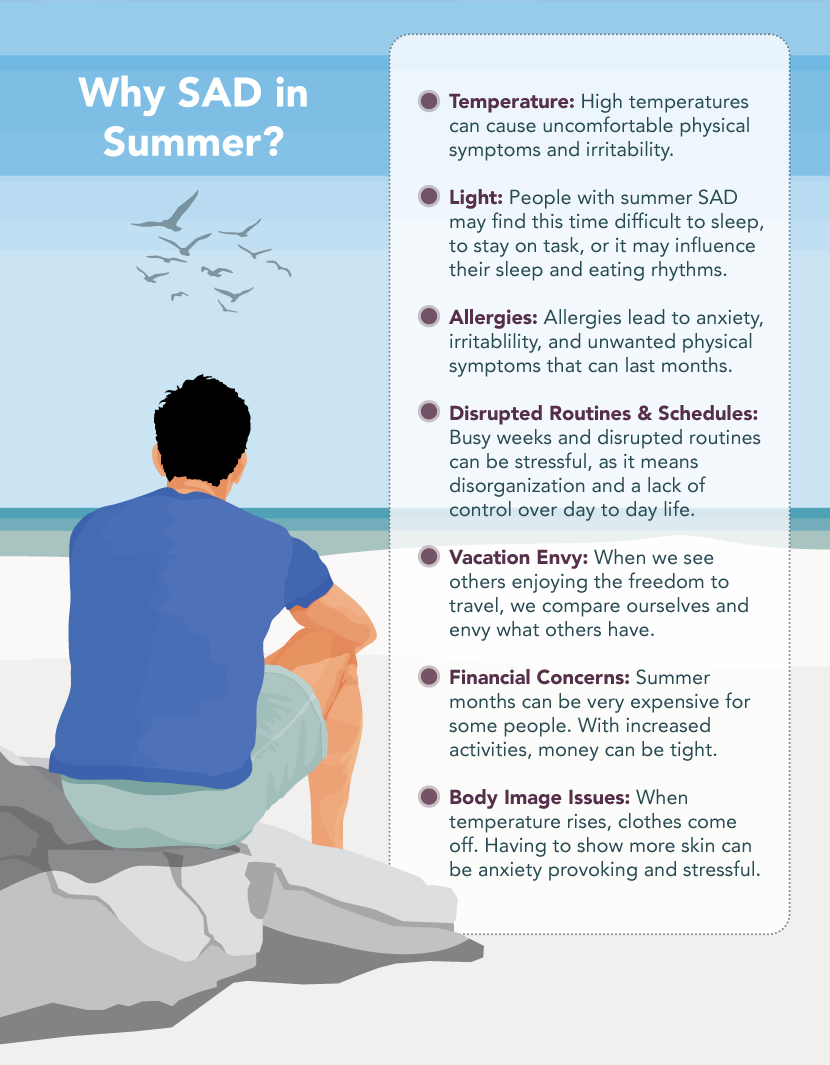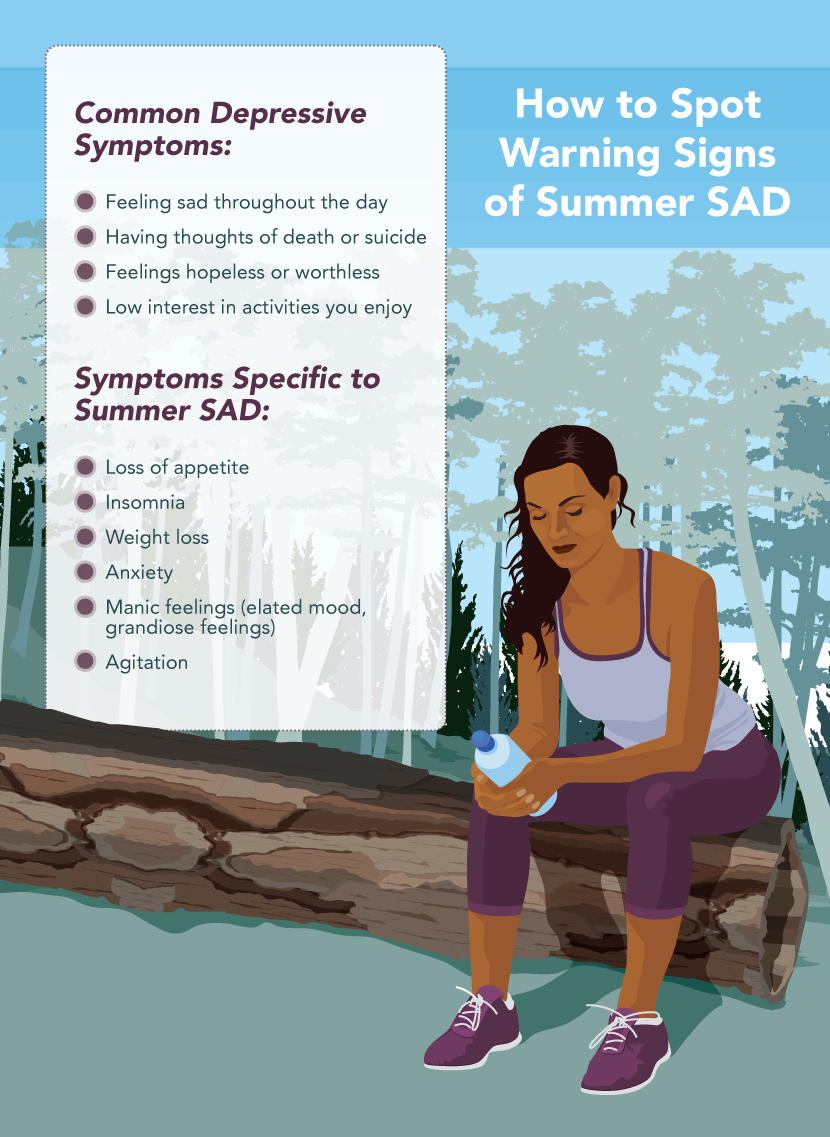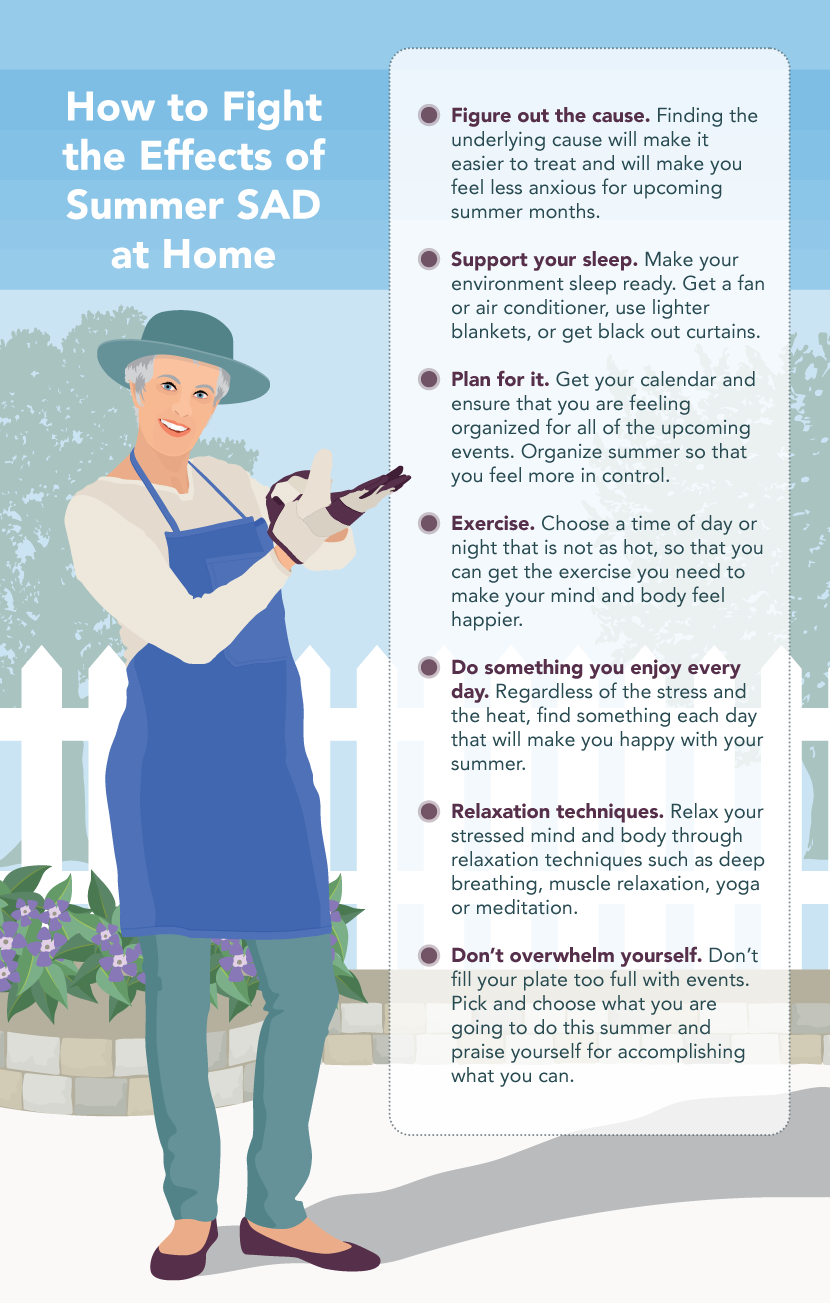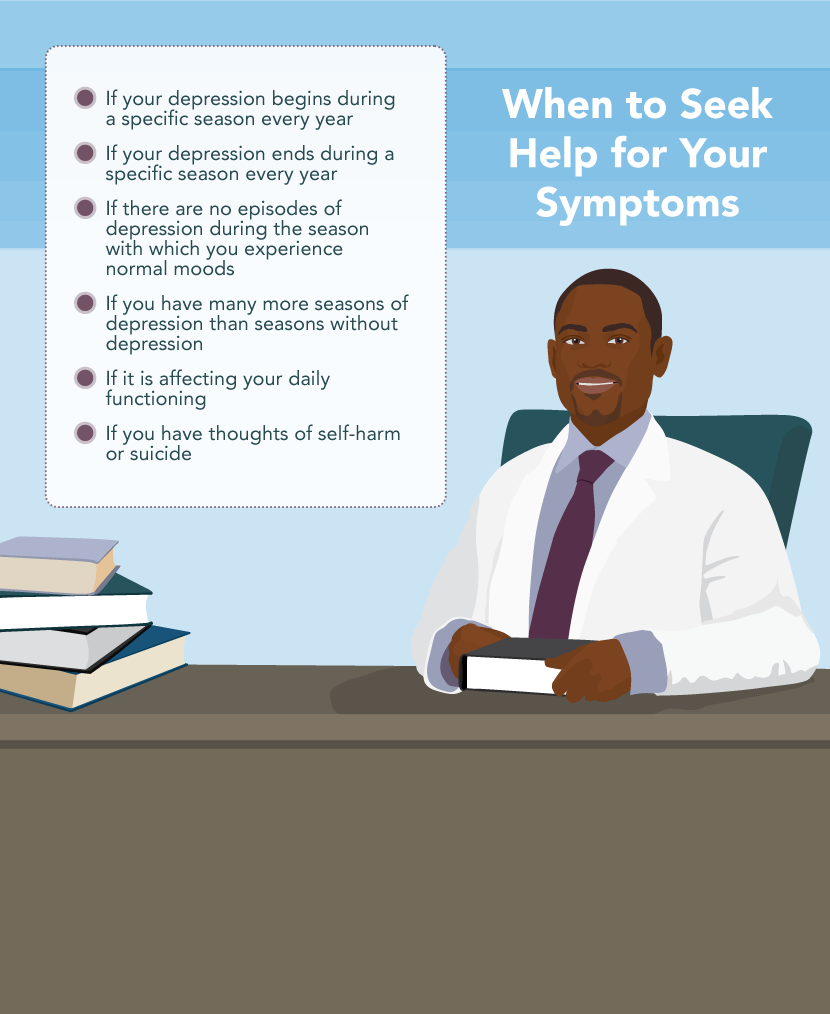Summer Depression:
Experiencing SAD in Sunny Months
Seasonal Affective Disorder, or SAD, is often thought of as a winter disorder,
affecting approximately 4-6 percent of the United States population.
However, SAD is a disorder that affects a person’s mood in a seasonal pattern;
this pattern does not necessarily have to be associated with dark, cold, wintery months.
Although Summer SAD is not widely studied, it is estimated that approximately 10 percent of all people with SAD experience it in summer months.
For most people, when summer comes it is a happy season full of fun and growth.
However, for some, summer can mean an increase in depressive symptoms.
For people suffering some winter SAD, depressive symptoms stem from a lack of light or fewer daylight hours.
Evidence for this is seen in the effectiveness of light exposure therapy.
Unfortunately, the causes of summer SAD are less known and studied.
Here are some assumptions as to why people may experience summer SAD:
Temperature: For many, the heat can be oppressive.
You may feel like hiding in the shade, or always want to stay in an air conditioned room.
You may avoid events outside due to the heat. Heat can make us feel irritable and annoyed.
Heat also influences the way we feel physically, causing sweating, sunburn, and rashes.
Light: In some regions, it can be light for long periods during the day and night.
For some, this can make it difficult to concentrate or fall asleep.
Allergies: The onset of summer for many equates to allergy season.
Some scientists believe that inflammation in the respiratory airways can trigger depression in some people.
People with severe and chronic allergies may be more at risk for summer SAD, as this condition is difficult to manage during summer months.
Disrupted Routines and Schedules: For some, disruption in routine and the structure of everyday life can be stressful.
In most cases, summer is a time where routine changes, everyday structure is different,
and the calendar may be filled with lots of activities. These disruptions can cause a lack of sleep, inability to perform at work, and bad eating habits.
Vacation Envy: Some people have the luxury of going on vacations and engaging in exciting activities during the summer months.
But for others, vacationing may not be in the forecast. The comparisons we make to others’ lives and the envy we feel toward others can be damaging to our mental health.
Financial Concerns: Summer is a busy time and it can be expensive! Vacations,
summer camp for the kids, and outdoor activities can add up. The stress of these seasonal expenses may add to depressive states.
Body Image Issues: When it gets hotter out, the layers come off. A lot of people feel self-conscious and ashamed about their body.
When we feel embarrassed or ashamed of ourselves, this can influence our perception of summer time.
You may sometimes even avoid places like the beach or swimming pool out of feelings of embarrassment.

Seasonal Affective Disorder (SAD) is a subtype of major depression that has a seasonal pattern. Therefore, SAD has many of the same symptoms of major depression, such as:
- Feeling sad throughout the day
- Having thoughts of death or suicide
- Feeling hopeless or worthless
- Low interest in activities you once enjoyed
However, there are specific symptoms directly related to Summer SAD that have an impact a person’s physical and mental health.
Symptoms that typically occur in people with summer SAD include:
- Loss of appetite
- Insomnia
- Weight loss
- Anxiety
- Manic feelings (elated mood, grandiose feelings)
- Agitation

Summer SAD can be managed individually right at home. Here are some ways that you can fight the effects of your summer SAD symptoms:
Figure out the cause: Before you begin to support yourself through feelings and symptoms,
it is important to consider where they are coming from. Break the cycle by figuring out why you are feeling the way you are.
Is it the heat that is making you avoid situations? Is it the stress of family vacations?
Is it the kids being home all day that is driving you crazy? Finding the underlying cause will make it easier to treat.
Support your sleep: If you are having difficulty sleeping, make sure your environment is sleep ready.
Get a fan or air conditioner, use lighter blankets, or get blackout curtains. When we get enough sleep, we are less agitated and depressed.
Plan for it: You know when summer is happening! So get out your calendar or day planner
and ensure that you are feeling organized for all of the upcoming kid, family, vacation, and work events.
Book your kids’ camps well in advance so you do not feel the stress of lack of childcare.
Organize summer so that you feel more in control.
Exercise: Regular exercise can boost serotonin and endorphins, which make our brain feel good.
If you want to stay clear of the heat, exercise indoors, or choose early morning or late at night when it’s not as hot.
Do something you enjoy every day: So the heat and the light have got you down?
Do something fun during the nighttime. Wake up early that day and do yoga outdoors.
Find something each day that will make you happy with your summer.
Relaxation techniques: Stressed about a hectic summer? Fearful of having to wear a swimsuit?
Try to relax your stressed mind and body through relaxation techniques such as deep breathing, muscle relaxation, yoga, or meditation.
Don’t overwhelm yourself: Summer months are considered the time when everything needs to be done.
Try not to overwhelm yourself with the events, the family gatherings, the vacations.
Pick and choose what you are going to do this summer and praise yourself for accomplishing what you can.

It is important to recognize your symptoms before they get worse. Symptoms become an issue when you feel that they are
severe enough to cause difficulty or impairment in your ability to function at home, at work, or within relationships.
If your mental and physical state is affecting your daily living, you should see a mental health professional
or your family doctor to discuss treatment options. Here are some guidelines on when to seek professional support:
- If your depression begins during a specific season every year
- If your depression ends during a specific season every year
- If there are no episodes of depression during other seasons
- If you have many more seasons of depression than seasons without depression
- If it is affecting your daily functioning
- If you have thoughts of self-harm or suicide

Seasonal Affective Disorder (SAD) is not just a winter disorder: It can also occur during sunny months.
If you are experiencing some summer SAD symptoms, use the tips on this page to make your summer more manageable and happier.
Embed the article on your site

